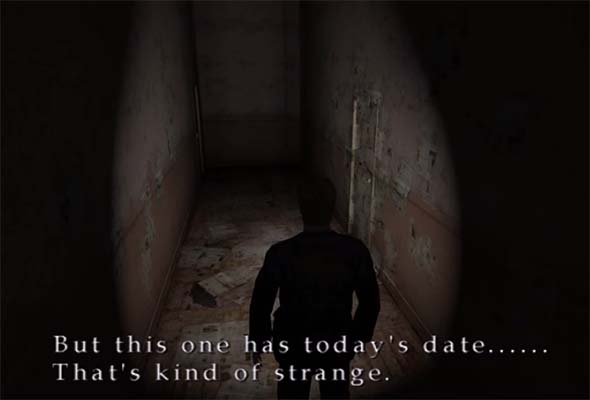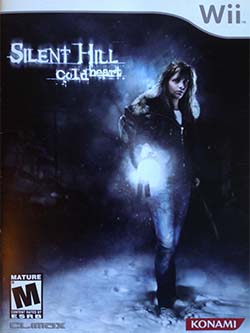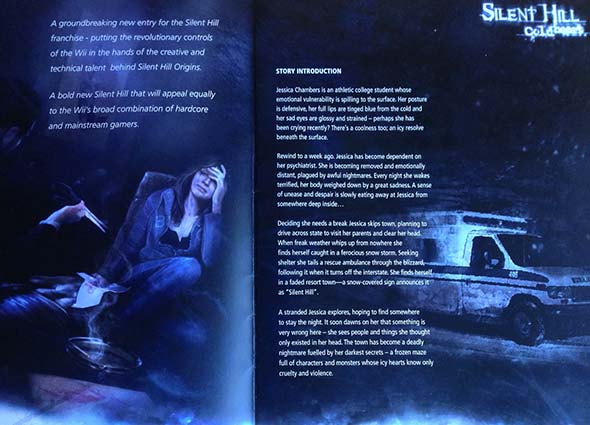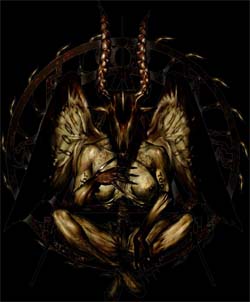
Last year, YouTuber Super Eyepatch Wolf posted a video titled "The Problem with Silent Hill 3: the Downfall of Team Silent". In that video, Super Eyepatch Wolf asserts that the design of Silent Hill 3 changed early in development, as a result of pressure from Konami. He claims that early designs for the game were going to be a more personal, introspective tale, in the vein of Silent Hill 2.
YouTuber Super Eyepatch Wolf posted a video last year asserting that Silent Hill 3
was originally going to be more similar to Silent Hill 2's personal and introspective story and style.
Konami may not have been happy with this early design because -- believe it or not -- there were apparently many vocal fans of the first Silent Hill game who were upset that Silent Hill 2 had not continued the story set forth by the first game. So Konami mandated that Team Silent make Silent Hill 3 be more of a continuation of the first Silent Hill, and so SH3 was re-written as a direct sequel to the first game, and returned to the narrative of a cult trying to birth a demon god.
I've adapted this blog post into a YouTube video response to Super Eyepatch Wolf.
It's hard to believe, but when it was first released, Silent Hill 2 was not universally regarded as the "gold standard" of video game horror. You can look at middling contemporary reviews from publications like Gamespot and GameInformer. In those days, the series was perceived as being "about occultism", and Silent Hill 2 was a stark deviation. Now, with a generation of gamers having grown up playing and loving Silent Hill 2, there's an effort now to re-frame the entire series as having always been about a haunted town torturing the guilty, even though three out of four of the original games are explicitly about a cult trying to re-birth its demon god, and repressed personal guilt is only featured in one of those four games.
Silent Hill 2 was the only of the original 4 games to be about the protagonist being punished for repressed guilt.
But that may not have always been the plan...
If Super Eyepatch Wolf is correct, then Team Silent may have wanted to pivot the narrative focus of the series away from occultism and towards more personal stories like SH2 -- though, importantly, not necessarily about repressed guilt or amnesia!
I have a complicated relationship with the question of "what is Silent Hill about?" Readers of my personal blog will know that I've rigorously defended the idea of Silent Hill (as a series) being about occultism, and that new entries in the series should respect that history, rather than trying to re-frame the entire series (and the nature of the town itself) to be about a haunted town that summons people to face their hidden guilt.
That being said, it isn't that I have a particular attachment to occult stories, even though a lot of the games that I like (such as Demon's Souls and Blooborne) also have strong occult threads. I also am definitely not opposed to more thoughtful, introspective stories. Silent Hill 2 is my favorite game in the series because of that thoughtful, introspective story! Rather, I've found all the third-party-developed games after Silent Hill 4 to be highly derivative of Silent Hill 2 and not particularly good.
Silent Hill 3 pivoted hard back towards the occult inspirations of the first game.
But is that really what Team Silent wanted?
Super Eyepatch Wolf does have some quotes and evidence to support the idea that Silent Hill 3 was originally intended to be a very different game -- all of which was taken from a single interview. But there's not much (if any) information about what the actual story of that game may have been. Nobody on Team Silent has (as far as I know) talked about it, nor do we have a leaked design document like what we have for Silent Hill: Cold Heart (the Wii-exclusive that eventually transformed into Shattered Memories).
... [More]

In the comments of a recent post about Silent Hill 2's Otherworld, I had a discussion with a reader about the time period in which the Silent Hill games take place. This is actually an interesting and difficult topic, so I thought that I would dedicate a post specifically to it.
First and foremost, let's remind ourselves of when the games were released:
| Game title | Original release |
 | Silent Hill | January 1999 |
 | Silent Hill 2 | September 2001 |
 | Silent Hill 3 | May 2003 |
 | Silent Hill 4: the Room | September 2004 |
UPDATE 1 January 2020:
A recent tweet from Masahiro Ito claimed that Silent Hill 2 was set in the "late 70's or early 80's", which would make my estimates about 10 later than Masahiro Ito understood the setting to be. If we take evidence in the first Silent Hill game at face value, this would mean that Silent Hill 2 would have to take place prior to the events of Silent Hill, since Silent Hill can take place no earlier than 1987.
It is also possible that Ito's comment is referring to the aesthetics of the game (in keeping with many of the game's film and literary influences), and not necessarily to its actual timeline. It isn't that I don't trust Ito's memory or his authority, but Team Silent went to great pains to conceal the exact date of the games (as we'll discuss in the following post), so it seems that they wanted the years in which the games take place to be ambiguous to the players -- which kind of makes this entire exercise moot.
Contemporary fiction
It is very important to note that no specific dates ever appear in any of the Silent Hill games that were developed by Konami's internal Team Silent studio. If dates are provided, they are either only the month and day (and not the year), or they are time periods relative to the events of the game (such as referring to the "events of 17 years ago" in Silent Hill 3), or it is just the year of an historical event in the past (such as the document about the sinking of the Little Baroness). Even documents that you would expect to have dates (such as newspapers, journals, diaries, patient reports, and police records) are intentionally left dateless (or at least ambiguous).
In Silent Hill 2, there is a point in which James finds newspapers scattered around a hallway. Upon examining the floor or walls, James comments that the newspapers have today's date. This would have been a perfect opportunity for the developers to provide a specific date for the game, if they wanted to. They could have had James read the date on the paper to the player, or the paper itself (with its date) could have been made clearly visible. The developers didn't do this; they left it completely ambiguous.

James notes that these newspapers have today's date, but doesn't tell us what the date is.
The developers went out of their way to not provide any specific dates for the games. Why would they do this? Typically, works of fiction that are not set in particular time period are written to be contemporary. Unless otherwise specified, most works of fiction should be assumed to take place now with respect to the consumption of the work by its audience, regardless of when "now" happens to be. if it's not contemporary to consumption, then it's usually contemporary to creation. This is usually pretty obvious if the work contains detailed descriptions of locations, technologies, and events that can be easily dated.
If we look at the original Silent Hill game in a vacuum, then the game provides no internal indication that it takes place at any specific time period. Players in 1999 probably had no reason to believe that the game took place in any year other than 1999. The same is true for Silent Hill 2, 3, and 4: if looked at in a vacuum, they can all be considered to take place in the same year that they were released. And if you didn't even know the year that the game was released, there's very little within the games to indicate that they take place at any time other than now.
However, this assumption falls apart because there is an absolute time difference of seventeen years between the events of the first game and the events of the third game, even though the difference in time between releases of the games was only four years. So we can't assume that each game takes place in the year of its release. At least one game has to be shifted on the timeline. So which game (or games) should be assumed to have taken place when? [More]
0ad2a2d3-abbc-4fd7-b255-126a5de4f3ba|8|4.8
Tags:Silent Hill, Silent Hill 2, Silent Hill 3, Silent Hill 4: the Room, history, Harry Mason, Heather Mason, James Sunderland, Maria, Henry Townshend, 1980s, 1990s, 2000s, 1986, 1987, 1994, 1999, 2003, 2008, 2016, Jeep Wrangler, telephone, cell phone, smart phone, rotary phone, computer, television, technology, anachronism, timeline, Konami, Team Silent, The Silence of the Lambs, Mary Shepherd-Sunderland

Shattered Memories was derived from
a pitch called "Cold Heart",
which was not supposed to be a "re-imagining".
This may be old news to some people, but earlier this month, I came across a post on Silent Hill Memories dot net that included scans of the full, 14-page pitch document for the game that became Silent Hill: Shattered Memories. Climax held a contest to give away seven copies of the document to fans, and scans of the document have since been posted online in various sources.
The document tells us that the final product ended up being radically different than the original concept. Apparently, Climax did not originally intend to do a remake / reboot / "re-imagining" of the original Silent Hill. Instead the plot would continue on with the standard Silent Hill timeline (presumabely following the events of Homecoming) with a new character. The game's working title was Silent Hill: Cold Heart. The document outlines what some of the game's intended features were supposed to be (including combat mechanics that were completely cut from the final product), describes the main character, and also provides a brief walkthrough of an early chapter of the game.
The introduction page describes the playable character: Jessica Chambers. Jessica was planned to be an over-stressed and emotionally-vulnerable college student. She ends up in Silent Hill after a freak snow storm causes her car to crash on her way to visit her parents.

Page 1 and 2 describe the main character, Jessica Chambers, and how she ends up in Silent Hill.
Jessica is described as being "emotionally vulnerable" and is dependent on a therapist. She has nightmares and is "weighed down by a deep sadness". The pitch doesn't specify the nature of this sadness or her reason for being dependent on a therapist (other than perhaps the stress of college).
I would suspect that the reason for her sadness and the therapy would have been similar to Shattered Memories: that one or both of her parents are probably dead, she has repressed the memory, and experiences nightmares of Silent Hill as a subconscious attempt to confront these repressed memories. You know, repressed memories of dead people is what Silent Hill is all about, right? ... [More]
3ffed8ed-e518-4294-811c-8ecf5f0019c3|7|3.4
Tags:Silent Hill Shattered Memories, Silent Hill Cold Heart, Konami, Nintendo, Wii, pitch, sequel, reboot, therapy, horror, puzzle, combat, map, Jessica Chambers, Cheryl Mason, Heather Mason, women, Silent Hill, Climax Studios

I was going through the comments on my posts a while back, and I came across a doozy of a comment by user Maiden T. I'm not going to replicate the entire post here, but you can review the comment at the link provided. In summary, the commenter asserts that Silent Hill, as a series, was never about occultism, and that all the games were "repressed-memory morality tales". The first Silent Hill and "to an extent the third one" are the exceptions (according to Maiden T).

Totally unrelated image of a demon god...
My mind just about exploded when I read this comment, and I started typing up a response, only to realize that I had written a whole blog's worth of counter argument. So, I decided to just turn it into a new blog. I'll continue my series of analysis and interpretation articles about Silent Hill with a write-up about how the series is most definitely about occultism.
What is Silent Hill about?
I've already tackled two topics that I consider to be common myths about Silent Hill. The first was about the over-sexualization of Pyramid Head, and the second was about the realness of the Otherworld. Now I'll address one of the most fundamental misunderstandings about the series: what is it about?
The repressed-inner-demon myth
Probably the most core and fundamental myth about the Silent Hill series is the continued propagation of the idea that the series (as a whole) is about characters dealing with repressed inner demons - typically a repressed memory of guilt over a perceived sin which they have committed. This idea is rooted in the popularity of Silent Hill 2. It is so pervasive, that the designers and producers of newer installments of the series embrace it, while dismissing the other critical elements of the other games' stories:
"[My favorite SH game is] Silent Hill 2. I didn’t really care for all the heavy occult based storyline in SH1 and 3. I felt SH2 had the best stand alone storyline, and provided the best atmosphere of all the SH games by far.
[...]
I find all the in’s and out’s of ‘The Order’ to be overly intricate and rather uninteresting, but that’s just my opinion."
- Devin Shatsky (producer, Shattered Memories, Downpour), in an interview with Hell's Descent (Nov 5, 2010).
The reason that Silent Hill 2's design was so successful (and unique within the series) is because SH2's excellent atmosphere was based around feelings of melancholy and depression rather than fear and threat.
Exploring a character's personal guilt and depression works great when the entire game is designed around that central, unifying theme! It doesn't work quite so well when ... [More]
04f88e94-11ac-43f4-beb3-1cd282060bf0|19|4.1
Tags:Silent Hill, Silent Hill 2, Silent Hill 3, Silent Hill 4: the Room, Silent Hill Origins, Silent Hill Homecoming, Silent Hill Downpour, Silent Hill Shattered Memories, Team Silent, Konami, cult, occult, fan fiction, horror, Harry Mason, Alessa, Dahlia Gillespie, Cheryl Mason, Heather Mason, James Sunderland, Red Pyramid Thing, Pyramid Head, Claudia Wolf, Vincent Smith, Henry Townshend, Walter Sullivan, Travis Grady, Alex Shepherd, Shepherd's Glen, Murphy Pendleton, ritual, Flauros, demon, god, Mary Shepherd-Sunderland

One of the greatest strengths of the early Silent Hill games - developed by internal Konami studio Team Silent - is their exceptional character design. The characters presented in these games are among the best in all of gaming history at illiciting emotional responses from the players - both positive and negative.
It all starts at the top, as the protagonists of all three games stand tall and proud as paragons of game character design. This blog will contain major plot spoilers for Silent Hill 1-3. Read at your own risk!
Having relatable and likable characters is essential to the success of just about any horror story (whether in the form of a book, movie, game, or any other medium). It's hard to feel afraid for a character that you just don't care for.
Harry Mason of Silent Hill is a great example of a relatable "Joe Everyman" protagonist. Harry is a simple writer trying to take his daughter on a vacation. He wrecks his car and wakes up to find his daughter is missing in a seemingly deserted and haunted town that is closed off from the outside world. Harry isn't a superhero or elite special forces operative. He's just a guy. He could be anybody. This makes him instantly relatable to an audience. [More]
|

| 12 | | | | | | | 60 | | 11 | | | | | | | 55 | | 10 | | | | | | | 50 | | 09 | | | | | | | 45 | | 08 | | | | | | | 40 | | 07 | | | | | | | 35 | | 06 | | | | | | | 30 | | 05 | | | | | | | 25 | | 04 | | | | | | | 20 | | 03 | | | | | | | 15 | | 02 | | | | | | | 10 | | 01 | | | | | | | 05 |
|